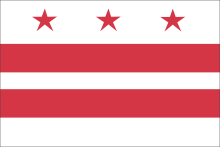Updated: 1/2009
Status: Permitted
Statute
 District of Columbia Official Code DC ST §25-101 defines Beer as a fermented beverage of any name or description manufactured from malt, wholly or in part, or from any substitute for malt; and Wine as an alcoholic beverage containing not more than 14% alcohol by volume obtained by the fermentation of the natural sugar content of fruits or other agricultural products containing sugar whether or not other ingredients are added. District of Columbia Official Code DC ST §25-906 follows the laws of the United States for exemptions of any alcoholic beverage from taxes.
District of Columbia Official Code DC ST §25-101 defines Beer as a fermented beverage of any name or description manufactured from malt, wholly or in part, or from any substitute for malt; and Wine as an alcoholic beverage containing not more than 14% alcohol by volume obtained by the fermentation of the natural sugar content of fruits or other agricultural products containing sugar whether or not other ingredients are added. District of Columbia Official Code DC ST §25-906 follows the laws of the United States for exemptions of any alcoholic beverage from taxes.
Discussion
District of Columbia Official Code DC ST §25-906 says that tax or fee exemption from regulation is the same as the federal laws of the United States, so homebrewing is permitted.
Special Provisions
N/A
State Alcohol Beverage Control Agency
- District of Columbia Alcoholic Beverage Regulation Administration
- 941 North Capitol Street, NE, Suite 7200
- Washington, DC 20002
- Phone: 202.442.4423
- Fax: 202.442.4521
Applicable Statutory Material
§25-101 Definitions.
For the purposes of this title, the term:
(5) “Alcoholic beverage” means a liquid or solid, patented or not, containing alcohol capable of being consumed by a human being. The term “alcoholic beverage” shall not include a liquid or solid containing less than one-half of 1% of alcohol by volume.
(10) “Beer” means a fermented beverage of any name or description manufactured from malt, wholly or in part, or from any substitute for malt.
(56) “Wine” means an alcoholic beverage containing not more than 14% alcohol by volume obtained by the fermentation of the natural sugar content of fruits or other agricultural products containing sugar whether or not other ingredients are added.
§25-906. Exemption from tax.
No tax shall be levied and collected on any alcoholic beverage exempt from tax under the laws of the United States, or on any alcohol sold for nonbeverage purposes by the licensee under a manufacturer’s or wholesaler’s license in accordance with the regulations promulgated by the Council.
Note: The information presented here is to the best of our knowledge and should not be used as a substitute for legal advice specific to the laws of your state.

Share Post